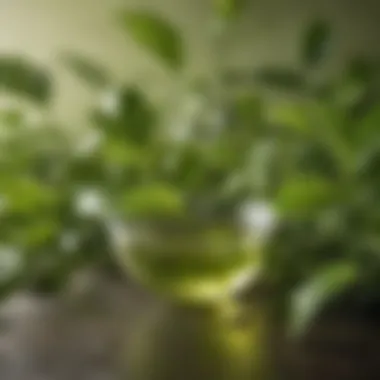Discover the Best Cleansing Teas for Detox


Intro
Cleansing the body through various means is a topic that garners attention in health discussions. One popular method is through herbal teas known for their detoxifying properties. Many individuals turn to these beverages not just for their delightful taste but also for their perceived benefits related to health improvement. This article explores a selection of teas reputed for their cleansing capabilities, diving into their specific benefits, key ingredients, and practical tips for incorporation into daily routines.
Through understanding the components of these teas and how they contribute to detoxification, readers can gain insight into their own health practices. It is vital to consider not just what these teas can do but also how to prepare and consume them effectively.
With the right information, integrating these teas into your routine can enhance your wellness journey. Let’s delve deeper into the topic to discover what makes these specific teas valuable for body cleansing.
Foreword to Cleansing Teas
Cleansing teas are recognized for their potential to support the body's natural detoxification processes. They are a subject of interest not just for their delicious flavors but also for the myriad ways they can positively impact health. This section explores the significance of cleansing teas, detailing the importance of understanding both body cleansing and the role of tea in detoxification.
Understanding Body Cleansing
Body cleansing refers to the process of eliminating toxins and impurities that accumulate over time and can affect overall health. Modern lifestyles, characterized by processed foods and environmental pollutants, leave our bodies in need of support. This is where cleansing teas can play a role. Incorporating these teas into a daily routine may help promote better digestion and enhance liver function, which are vital for toxin elimination.
There exists variabilty in the effectiveness of cleanse methods. Some popular beliefs state they can provide quick fixes, but evidence for long-term benefits is varied. One must approach cleansing with realistic expectations. It is about gradual improvement and not just fast results. It is important to note that while some individuals experience noticeable effects, others may not feel a dramatic change. However, many find that regular consumption contributes to a sense of overall well-being.
The Role of Tea in Detoxification
Tea has been consumed for centuries, and its benefits extend far beyond simple hydration. Certain types of tea contain compounds that may aid bodily functions.
- Antioxidants: Many teas are rich in antioxidants, which combat free radicals in the body.
- Caffeine: In moderation, caffeine found in green or black tea may stimulate metabolism and support fat oxidation.
- Herbs and Botanicals: Herbal teas like dandelion and ginger carry specific properties believed to enhance detox processes.
Drinking these teas can work synergistically with the body's innate detox systems. Regular consumption may assist with digestion and help reduce inflammation, creating a more favorable environment for health. Along with a balanced diet and hydration, integrating cleansing teas can become part of a holistic approach to well-being.
Health Benefits of Cleansing Teas
Cleansing teas offer numerous health benefits that go beyond mere hydration. These teas, when incorporated into a regular routine, can support overall wellness in various significant ways. Understanding these benefits is crucial for anyone seeking to enhance their health through natural means. This section will explore the major health advantages of cleansing teas, focusing on digestive health, metabolism, and immune function.
Enhancing Digestive Health
Cleansing teas, particularly those made from herbs like peppermint and ginger, can greatly enhance digestive health. Peppermint tea is well-known for its ability to alleviate bloating and indigestion. It works by relaxing the muscles of the gastrointestinal tract, which can ease discomfort after meals. Ginger tea, on the other hand, is often used to combat nausea and inflammation in the digestive system.
Regular consumption of these teas may promote healthy bowel movements and prevent constipation. The soothing properties of these beverages help in breaking down food effectively, which is essential for nutrient absorption. It is important to focus on choosing high-quality ingredients to maximize these benefits.
Boosting Metabolism
Cleansing teas can also play a role in boosting metabolism. Green tea is particularly noted for its thermogenic properties, which can aid in weight management. The catechins in green tea have been shown to increase the rate of calorie burning, even when at rest. This can be beneficial for those looking to enhance their weight loss efforts consistently.
Cleansing teas can also provide a natural energy boost without the jitters associated with caffeinated beverages. They support metabolic functions, allowing the body to utilize energy more effectively. For those aiming for an active lifestyle, integrating these teas can be a strategically beneficial choice.
Supporting Immune Function
Another essential benefit of cleansing teas is their support for immune function. Herbal teas like hibiscus and dandelion are rich in antioxidants, which help to combat free radicals in the body. Free radicals can contribute to various diseases, including those affecting the immune system.
Hibiscus tea, specifically, is popular for its high Vitamin C content, which is vital for maintaining a strong immune response. Dandelion tea can help stimulate liver function, further aiding in detoxification and immune system health. Regularly consuming these types of teas may provide a proactive approach to immune support, especially during flu season or times of stress.
"Integrating cleansing teas into your routine may promote better health, support digestion, boost metabolism, and strengthen your immune system."
Popular Types of Cleansing Teas
Cleansing teas are more than just beverages; they are potent allies in the quest for improved wellness. Different teas offer distinct advantages, making it essential to explore popular types. Each variety has unique properties that support the body's detoxification processes, contributing to holistic health. Understanding these teas aids in making informed choices that align with personal health goals.
Green Tea
Key Components and Benefits


Green tea is known for its high concentration of antioxidants, specifically catechins. These compounds play a crucial role in detoxification. They help neutralize free radicals in the body, which can cause cellular damage. This protective quality makes green tea a popular choice. It may help in reducing the risk of chronic diseases. Additionally, green tea is often celebrated for enhancing metabolism, which can further support cleansing efforts.
Brewing Techniques
Brewing green tea requires attention to detail for optimal flavor and health benefits. The water temperature is paramount; using water at around 160-180°F is ideal. Steeping for 2-3 minutes is recommended to extract the beneficial compounds without resulting in a bitter taste. This precise brewing enhances the flavor while retaining nutrients, making it a beneficial method for those seeking to enjoy its cleansing effects.
Best Time to Consume
The timing of green tea consumption can influence its effectiveness. Drinking it in the morning can kickstart metabolism and energy levels. Consuming it between meals may also aid in digestion. This strategic timing maximizes the tea's potential benefits, making it a practical choice for daily routines.
Peppermint Tea
Digestive Benefits
Peppermint tea is particularly recognized for its soothing properties on the digestive system. It contains menthol, which can relax the muscles of the gastrointestinal tract. This function aids in alleviating discomfort, such as bloating or gas. As a result, peppermint tea is often recommended for enhancing digestive health, making it a valuable addition to a cleansing regimen.
Preparation Methods
Preparing peppermint tea is straightforward. Fresh leaves or dried peppermint can be steeped in hot water for about 5-10 minutes. This flexibility allows for customization based on personal preference. Such simple preparation methods encourage more individuals to incorporate it into their daily health routine.
Pairing Suggestions
Pairing peppermint tea with certain foods can enhance its benefits. Incorporating it after meals can promote better digestion. Furthermore, combining it with ginger can create a potent digestive aid. These harmonious pairings not only elevate the flavor but also amplify the health advantages associated with peppermint tea.
Ginger Tea
Anti-Inflammatory Properties
Ginger tea is well-regarded for its anti-inflammatory effects. Gingerol, the active compound in ginger, helps in reducing inflammation in the body. This is particularly beneficial for individuals who experience chronic inflammation. Therefore, ginger tea serves as a compelling option for those aiming to support their body’s natural cleansing processes.
How to Make Ginger Tea
Making ginger tea is a simple process. Fresh ginger slices can be steeped in boiling water for 10 minutes. This method extracts the vibrant flavor and health benefits. The unique feature of ginger tea lies in its versatility; it can be enjoyed hot or iced, catering to individual preferences.
Recommended Consumption
For optimal results, ginger tea is recommended to be consumed at least once a day. Its warming nature is often best appreciated in the morning or evening, as it can aid digestion and relaxation. This regular consumption aligns with cleansing objectives, making it an ideal fit in a daily health routine.
Dandelion Tea
Liver Support
Dandelion tea is renowned for its detoxifying properties, especially regarding liver health. It contains compounds that may help cleanse the liver, thus supporting overall detoxification. This makes dandelion tea a strong candidate for those focused on improving their liver function as part of a cleansing strategy.
Brewing Instructions
Brewing dandelion tea can be done using dried roots or leaves. The general recommendation is to steep them in boiling water for 10-15 minutes. This method enables the full extraction of the tea's beneficial properties. Such straightforward instructions make dandelion tea accessible to a wider audience.
Potential Side Effects
While dandelion tea offers several health benefits, it is essential to be aware of potential side effects. Some individuals may experience allergic reactions or digestive discomfort. Consult a healthcare professional when incorporating it into your regimen, especially if you have underlying health conditions or are taking medications.
Hibiscus Tea
Heart Health Benefits
Hibiscus tea is lauded for its effects on heart health. Studies suggest that it may help lower blood pressure, which is vital for cardiovascular wellness. This characteristic positions hibiscus tea as a valuable option for anyone interested in maintaining a healthy heart while pursuing cleansing goals.


Brewing and Serving Tips
To brew hibiscus tea, steep dried flowers in hot water for about 5-10 minutes. The vibrant red color and tart flavor make it visually appealing and enjoyable. Serving it chilled can also enhance the experience, especially during warm weather. This versatility makes hibiscus tea an exciting and refreshing choice for many.
Complementary Ingredients
Incorporating complementary ingredients like honey or lime can enhance the flavor and benefits of hibiscus tea. Honey adds natural sweetness, while lime introduces a zesty twist. These additions not only improve taste but also provide extra health benefits, making hibiscus tea even more appealing to health-conscious drinkers.
Each type of cleansing tea brings unique benefits. Experimenting with them can help you find the right fit for your health journey.
Preparing the Perfect Cleansing Tea
The technique of preparing cleansing tea is essential to extracting the maximum benefits from the various ingredients used. A well-prepared tea not only enhances the flavor but leverages the unique properties of each herbs or tea leaves to improve detoxification processes in the body.
To achieve optimal results, emphasis must be placed on selecting quality ingredients that retain their beneficial compounds. Additionally, using correct brewing methods will ensure that the tea is not overly bitter or bland. Moreover, patience in steeping and taking care to adhere to the specific temperature for brewing can make a substantial difference.
Selecting Quality Ingredients
Selecting high-quality ingredients is fundamental. The potency of cleansing tea relies on the freshness of the components. Organic varieties without pesticides or additives are preferable. This ensures that the cleansing properties are preserved. Ingredients such as green tea, dandelion, and ginger should be sourced from reputable brands to guarantee effectiveness.
Fresh herbs can also boost the tea’s health benefits. When possible, buying whole forms of ingredients rather than pre-packaged blends can provide superior flavors and nutrients.
Optimal Brewing Methods
Water Temperature Considerations
Water temperature is often overlooked when preparing tea, yet it significantly impacts flavor extraction and health benefits. Different types of tea require specific temperature settings to unlock their potential. For example, green tea is best brewed at around 175°F. This crucial detail helps prevent bitterness, allowing the natural flavors to emerge.
Brewing with appropriate temperatures optimizes antioxidants and essential oils. Using water that is too hot can alter the chemical composition, losing some health benefits. Learning the right temperature is essential for those wishing to create the perfect cup of cleansing tea.
Steeping Time Recommendations
Steeping time is another critical factor. Each type of tea has its ideal duration to fully extract flavors and beneficial components. For instance, green tea requires just two to three minutes of steeping, while dandelion tea may need five to ten minutes.
Proper timing helps avoid over-extraction, which can lead to unpleasant tastes and decreased health benefits. By keeping to recommended steeping times, it allows the components to infuse without overwhelming the palate.
When to Drink Cleansing Teas
The timing of when to drink cleansing teas can significantly influence their effectiveness. Choosing the right moment to consume these beverages enhances their detoxification properties and maximizes their benefits to your body. Understanding when to integrate these teas into your daily routine allows for better absorption of nutrients and can help establish a consistent habit that promotes overall well-being.
Consuming cleansing teas at optimal times can help manage digestive processes, hydrate the body, and provide a feeling of rejuvenation. The following sections delve into specific timeframes for enjoying these teas, highlighting their respective advantages and any considerations to keep in mind.
Morning Rituals
Starting your day with a cup of cleansing tea can set a positive tone for the hours to come. Drinking tea in the morning is not only refreshing but also supports the body’s natural detoxification processes after a night of fasting. Morning herbal choices, like peppermint or ginger tea, can stimulate digestion and awaken your senses.
Here are some key points to consider for morning consumption:
- Hydration: After a night without water, a cup of tea helps rehydrate the body.
- Boosted Metabolism: Teas like green tea may enhance metabolic rates, which can aid in weight management and energy levels.
- Mental Clarity: Certain teas can help clear the mind and increase alertness, contributing to a productive day ahead.
Setting aside a few moments each morning for this ritual can encourage mindfulness and self-care.
Post-Meal Consumption
Drinking cleansing tea after meals serves as an effective way to support digestion and promote a sense of fullness. Certain teas can aid in the breakdown of food, potentially alleviating discomfort that follows heavy meals. Drinking ginger tea, for example, has been linked to reducing bloating and promoting digestive health.
Consider these points for post-meal tea drinking:


- Digestive Aid: Herbal options like dandelion tea assist the liver and digestive system to process nutrients efficiently.
- Mindful Consumption: Taking time after a meal to enjoy tea encourages slow, deliberate eating habits and aids in digestion.
- Flavor Pairing: Some cleansing teas can complement the flavors of your meal, enhancing the overall culinary experience.
Integrating Cleansing Teas into Your Routine
To maximize the benefits of cleansing teas, it is crucial to integrate them thoughtfully into your daily routine. A systematic approach enhances their health advantages, making them an effective part of your detox regimen. Incorporating these teas effectively can support your overall wellness strategy, improve digestion, and promote a feeling of rejuvenation. By aligning your tea consumption with your lifestyle, you can enjoy their properties continuously rather than sporadically.
Creating a Daily Schedule
Establishing a daily schedule for tea intake is key to achieving the desired effects of cleansing. It is useful to set specific times for consumption, as this helps in creating a habit. Common practices involve starting the day with a cup of green tea that can enhance metabolism. Consuming dandelion tea in the afternoon can support liver function.
In the evening, herbal teas like peppermint can aid relaxation and digestion after meals. This structured approach ensures you receive consistent benefits from the detox properties of various teas. Additionally, time your consumption around meals; this integration allows your body to process nutrients more effectively, while also upside down the potential side effects some teas may have.
Combining with Other Wellness Practices
Nutrition
The relationship between nutrition and cleansing teas is integral. A balanced diet complements the detoxifying effects of the teas. Focusing on whole foods, such as fruits, vegetables, and whole grains, ensures your body has all the necessary nutrients to detoxify effectively. Also, it is important to maintain hydration. Plenty of water can enhance the cleansing effect of teas and flush out toxins efficiently. This approach is not just popular among health enthusiasts; it also provides an extensive range of essential vitamins and minerals. Moreover, emphasizing organic varieties of produce can reduce exposure to pesticides, aligning well with the principles of detoxification.
One thing to consider is that over-restricting diet can sometimes lead to negative health impacts. It's vital to ensure that you are not unnecessarily depriving your body of essential nutrients while focusing on cleansing.
Exercise
Incorporating exercise into your daily routine can greatly enhance the benefits of cleansing teas. Regular physical activity not only improves circulation but also supports the body's natural detoxification processes. Engaging in activities, like jogging or yoga, can stimulate the lymphatic system, which is crucial for effective detoxification. The character of exercise that aids in detoxification is its ability to promote sweating, aiding further in toxin elimination.
Exercise, particularly when paired with cleansing teas, can create a synergistic effect that supports overall health. When consumed before or after a workout, cleansing teas can help hydrate the body while delivering beneficial antioxidants. It is important, however, to ensure that exercise routines are suitable for your personal fitness level to prevent unnecessary strain or fatigue.
Potential Risks and Considerations
When discussing cleansing teas, it is essential to recognize the potential risks and considerations involved. Despite their health benefits, certain teas may also pose risks if not consumed correctly. Understanding these elements helps individuals make informed choices regarding their wellness routines.
Understanding Allergies
Allergies can significantly affect how a person reacts to various teas. Some individuals may have sensitivities or allergies to specific ingredients commonly found in cleansing teas. For instance, ingredients like peppermint, ginger, or hibiscus can provoke allergic reactions in sensitive individuals. Symptoms can range from mild reactions, such as itching and hives, to more severe conditions like difficulty breathing. Therefore, it is essential to:
- Identify common allergens that might be present in teas.
- Perform patch tests when trying new ingredients for the first time.
- Consult ingredient labels carefully to avoid unknown allergens.
The best approach is to start with small quantities and monitor the body's response. If allergies or sensitivities are suspected, discontinuing use and seeking alternatives is advisable.
Consulting Healthcare Professionals
Before incorporating cleansing teas into a daily routine, especially for individuals with preexisting health conditions, consulting healthcare professionals is crucial. It is important to consider the cumulative effects of cleansing teas combined with other medications or supplements. Some herbal ingredients in teas can interact with medications, altering their effectiveness or causing unwanted side effects. Health professionals can evaluate individual needs and provide recommendations based on medical history. Consider the following points:
- Inform your healthcare provider about any herbal teas or supplements you intend to use.
- Seek advice for specific health conditions, such as diabetes or hypertension, which may require careful monitoring.
- Discuss possible interactions between herbal components and prescribed medications.
Consulting a healthcare professional ensures that the benefits can be enjoyed safely while minimizing the risks associated with cleansing teas.
Closure
The conclusion serves as a critical component of this article, summarizing the essential insights regarding cleansing teas and their relevance to overall health. Not only does it reinforce the key benefits of incorporating these beverages into daily routines, but it also helps readers synthesize the information shared throughout the text.
Recap of Key Points
In recapping the key points, we highlight several areas that deserve attention:
- Cleansing teas provide valuable detoxification benefits, impacting digestion and metabolism.
- Popular types of cleansing teas, such as Green Tea, Peppermint Tea, Ginger Tea, Dandelion Tea, and Hibiscus Tea, each offer unique health properties.
- Understanding how to prepare these teas properly is crucial for maximizing their benefits.
- Integrating cleansing teas into a daily routine can support better health when combined with nutrition and exercise.
- Potential allergies and the necessity of consulting healthcare professionals are important considerations to keep in mind.
This structured overview of key points emphasizes the multifaceted nature of cleansing teas, allowing readers to appreciate their diverse contributions to health and wellness.
Encouragement for Exploration
Encouraging readers to explore cleansing teas further is essential. Each tea holds its own potential for health enhancement, waiting to be uncovered. Readers are urged to experiment with different types of teas, their brewing methods, and occasions for consumption.
- Consider trying out new flavors and blends, as this may yield unexpected benefits and enjoyment.
- Engage with communities that discuss various cleansing teas. Platforms like Reddit might have groups dedicated to this topic.
- Share personal experiences, as this can foster understanding and create a dialogue on the best practices in using cleansing teas.







